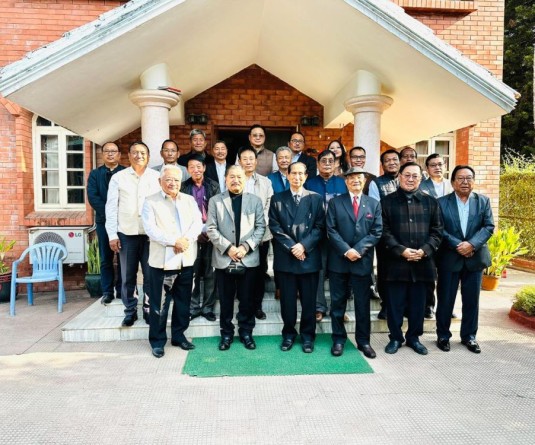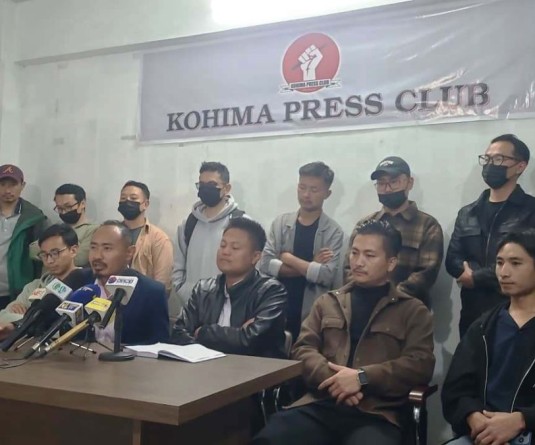SN Darthot Peter, Secretary of the Naga Village Chief Federation Manipur (NVCFM), hands over the memorandum to Additional District Magistrate Senapati, Nimmi Azingwungshi MCS, in the presence of other central committee members on September 23.

Senapati, September 23 (MExN): The Naga Village Chief Federation Manipur (NVCFM) submitted a memorandum to Union Home Minister Amit Shah regarding the suspension of the Free Movement Regime (FMR) and the fencing of the Indo-Myanmar border in Naga-inhabited areas of Manipur. The submission was made through Additional District Magistrate Nimmi Azingwungshi MCS at her office in Senapati on Monday.
As the apex body representing all Naga villages in Manipur, the NVCFM expressed its strong opposition to the suspension of the FMR and the border fencing, citing historical and cultural grounds. The federation emphasized that Naga villages have coexisted along the India-Myanmar border for centuries without conflict, predating the 1826 Treaty of Yandaboo between the British and Burma.
NVCFM articulated concerns that the current international boundary, a product of colonialism, disregards the rights and interests of the Naga people. The memorandum highlights the government's infringement on the rights of Naga chiefs to uphold their roles as custodians of village land, customs, and law and order, threatening the traditional village polity that has persisted throughout modern statehood.
Furthermore, the NVCFM referenced the Nagas' status as indigenous people and the infringement on their ancestral territories without consent, which falls under the protective provisions of the United Nations Declaration on the Rights of Indigenous Peoples. The federation argued that the suspension of the FMR compromises the right of the Naga people to move freely within their ancestral lands and exacerbates existing tensions.
The memorandum also noted that the Naga community has maintained neutrality amid the ongoing Meitei-Kuki ethnic conflict since May 3, 2023. NVCFM criticized the union government's policies as biased and detrimental, warning that the suspension of the FMR and border fencing could further divide the Naga people into “India-Naga” and “Myanmar-Naga.”
NVCFM highlighted that Nagas have historically been divided into four administrative states—Nagaland, Manipur, Arunachal Pradesh, and Assam—yet the federation insists on their natural right to remain united in their ancestral lands, a basic right they believe should be upheld by the Indian government.
Established in 2018 as part of India’s Act East policy, the FMR was intended to facilitate trade and improve access to education and healthcare for Nagas living along the border. The federation argued that the abrupt suspension of this regime has negated the progress made and intensified fears regarding their future as traditional custodians of their lands.
The memorandum was signed by several key figures, including SA Ramnganing, President of NVCFM, and other central committee members, urging the Union Home Minister to revoke the suspension of the FMR, restore traditional boundaries of Naga villages, and cease policies that could lead to the fragmentation of Naga territories.





